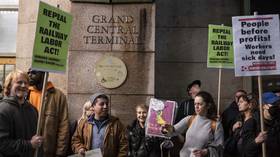If the US economy is doing great, why are most Americans not feeling it?

There’s been a debate lately in the United States about the supposed success of President Joe Biden’s economic policies and the “vibecession” (a perceived recession based on a pessimistic outlook on the economy, term coined by financial influencer Kyla Scanlon) apparently taking place, which has been led by one X (formerly Twitter) user named Will Stancil.
Will argues that Bidenomics – the collective name for the current administration’s economic strategy, which is directed ostensibly at supporting the working class, reducing income inequality, and strengthening the social safety net – is working. The US economy is red-hot and, on the back of historically low unemployment, labor finally has the power to push for higher wages and fairer contracts, which ought to be making people’s lives better.
But, as is always the case, the internet disagrees, and people’s lived experience contradicts the hard numbers. X users shouted Stancil down with the fact that property prices are through the roof, so much so that Generation Z can probably never even fathom home ownership. Others are pointing to the fact that most Americans still live paycheck-to-paycheck, which means that any semi-large financial event could see them on the streets.
These are fair points. Homeownership is the primary way for people to build generational wealth. Due to high interest rates and ballooning property prices, it’s true that young Americans who aren’t already in the market may never get in. That’s a huge factor in this and leads to the pervasive feeling that things aren’t going well. But there’s something a bit bigger at play.
At the same time, before delving further, it must be said that Will is correct. Bidenomics is apparently working, at least to the extent that finding a job is quite easy these days. According to recent surveys, job satisfaction is at a historic high, wages are going up and inflation has gone way down. But people just don’t feel that way. Another recent Wall Street Journal poll found that 58% of registered voters think that the economy has gotten worse over the past two years and 74% of them think inflation has moved in the wrong direction despite that evidently not being the case.
So what gives? Why do people feel so pessimistic if things are so great? Stancil would say that today’s world is different than the past. Particularly, due to the advent of social media and (perhaps) the polarization of the media, there is a large narrative that hypes up people’s discontent. He would say, much like the ancient philosophers, that we live in a world constructed by narratives and that our lived experience is highly influenced by our preconceptions.
There might be some merit to this, evidenced by how people were split on the economy of former US president Donald Trump even though it looked similarly good on paper. However, what’s really changed the most in about the past seven years or so is the fact that Americans – particularly younger Americans – are beginning to apply comparative politics in how they view the world, i.e. they are seeing the difference between how America functions compared to the rest of the world.
With just a pedestrian understanding of virtually any other country, you will see that our system is very unforgiving: Americans do not have universal health care, universal higher education, accessible public transportation, government-mandated vacation time, or generous social benefits found in most other countries. This alone creates a sense that we’re being cheated and that our lives are highly precarious, which I would argue, as an American who has lived and traveled to many countries, is mostly the case.
Today, outrageous housing costs are creating more and more blight and visible poverty, including more homeless people on the streets. For Americans, this creates an inherent fear, because we implicitly understand that we are one emergency or bad choice – in the case of addiction – from being on the streets too. So, even if the economy is doing quite well today by American standards, we feel that total financial ruin is always right around the corner if just one thing goes wrong.
This is why it’s important to approach the “vibecession” debate from a broader and systemic point of view that both looks at the numbers and takes lived experiences into account. For example, if it really is true that the economy has never been better – or, some might argue, at least not for decades – then how is it possible that so many people are on edge? Because the American socioeconomic system is designed to be that way.
Americans started to realize this once things like ‘Medicare for All’ and ‘Tuition-free college’ entered into mainstream discussion, and when ‘Democratic Socialism’ and leftist politics, in general, had a rejuvenation on the back of the 2016 Bernie Sanders campaign. That movement highlighted these systemic issues front and center, and it has continued to this day in helping Americans realize that the way we run things is perhaps not the best in terms of taking care of basic needs.
On this, I am reminded of one quote from Friedrich Engels in ‘Socialism: Utopian and Scientific’, in which he describes the concept of historical materialism. He wrote, “The growing perception that existing social institutions are unreasonable and unjust, that reason has become unreason, and right wrong, is only proof that in the modes of production and exchange changes have silently taken place with which the social order, adapted to earlier economic conditions, is no longer in keeping.”
While the average American is obviously not a card-carrying communist, the point is still relevant. It doesn’t matter how many jobs are created or how much wages grow in a quantitative way if the qualitative American experience remains precarious. That’s probably what is at the heart of why so many people feel that things are wrong.
The statements, views and opinions expressed in this column are solely those of the author and do not necessarily represent those of RT.
















